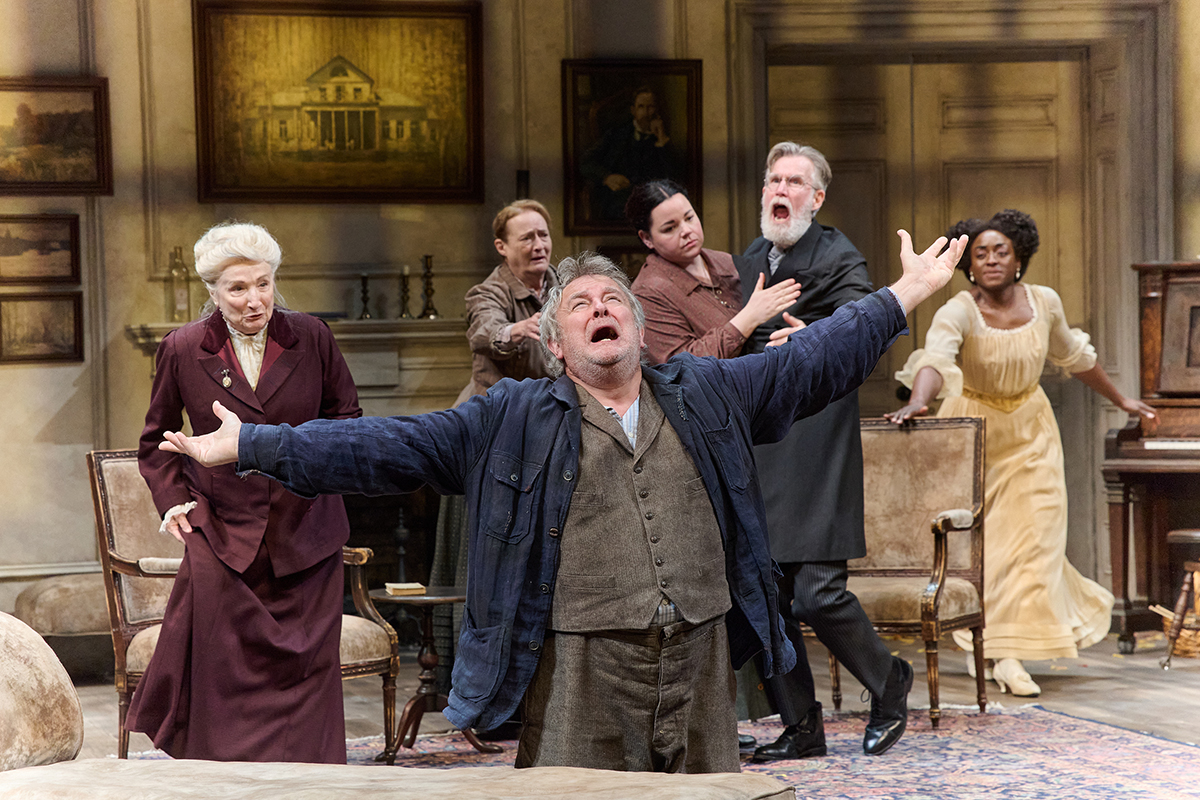“Private Lives,” “The Totalitarians” feature strong female protagonists, but leave unanswered questions
Separated by time and genre, you wouldn’t expect Noel Coward’s 1930s ever-so-British rom-com Private Lives to have much in common with Peter Sinn Nachtrieb’s The Totalitarians, a deeply funny and scathing take on 21st century American politics and culture. But take a look under the hood and they share a lot in common: irreverent humor, unmitigated cynicism and some very interesting questions about what women want. What they also share is the lingering sense that, despite clever and boisterous finales, the epilogues are riddled with less than rosy questions.

Photo by Scott Suchman
A “will-they, won’t they,” Private Lives starts the melee with two honeymooning couples who discover via the interconnecting balconies of an idyllic seaside hotel that they have made a very unlucky choice in room number. As we quickly learn, Elyot, who is now married to Sibyl, was five years earlier married to Amanda, the new wife of Victor. Even before the exes discover one another, no one is finding it easy to lay the previous – reportedly highly tumultuous – relationship to rest. Farcical battles of love and hate ensure, bobbing along on a river of Coward’s wit and joyfully provocative social commentary.
What keeps Lives interesting is not just its screwball comedy cuteness, but Coward’s remarkably timeless edge, an enduring steel that glints in and amongst the pretty manners and affectations of the age. As Elyot and Amanda alternately swoon and attack, Coward asks, What counts for love and is it anyone’s business but our own?
Yet, whether Coward intended it or not, this production, under the hand of director Maria Aitken, suggests something a little more about the female condition. Bianca Amato’s Amanda is an independent woman with flair — beautiful, lithe, and endlessly intriguing as she dances, sings and throws her barbs. But as much as we see she needs the stimulus of Elyot, he begins to look more like a bad habit than a cure.
Whether you look for the deeper resonances or not, it’s a tightly sprung and pleasurable production. Amato steals the day with her larger-than-life but highly expressive Amanda and Autumn Hurlbert is not far behind with a very funny and perfectly pitched Sibyl. The men hold their own, but with perhaps more bluster than flair. James Waterston is an attractive Elyot, but he is tad more adolescent than rakish and thus seems too somehow too crude an instrument for Amanda. He is also the least comfortable with the accent and it occasionally dampens the breezy delivery Coward requires. Also, without more chemistry, the swoons between Amanda and Elyot come over as a little too saccharine for a play of such gratifying cynicism.
Serving more as foil than anything else, Jeremy Webb as Victor keeps the momentum intact but feels a bit derivative of an old movie character. Nevertheless, none of the humor is lost, and, if the evening begins to dip in the second act, Aitken covers for Coward’s longer-winded scenes between the warring couple by delivering a charming and memorable vintage vision to the goings-on.
Flash-forward to the not too distant future and another husband and wife find themselves at war; although in The Totalitarians, it is of a more insidious variety. Coming at his material with the subversion angle of a graffiti artist/commentator, Nachtrieb moves between (at least) two levels. First is the marriage of Francine and Jeffrey, showing distinct signs of tension as they dance around Jeffrey’s gentle but insistent need for a baby and Francine’s not-so-gentle need for a career. Then there is the object of Francine’s drive; the ailing political campaign of Penny who is in need of a miracle-working speechwriter and manager. When a mysteriously unsettling saboteur begins his own campaign, everyone’s needs begin to surface with a relentlessness that brings disaster. If the aftermath has removed Francine from her trajectory, one has to ask for how long?
And it seems no accident that Nachtrieb’s dark unravelings posit another explosive and almost allegorically-delivered suggestion — that driven women breed, figuratively and literally, political and social danger and that it is men that must rein them in by any means necessary.
Essential to this provocative territory is candidate Penny. In a phenomenal performance, Emily Townley delivers this Nebraskan housewife-turned-local-contender with stellar concept and execution. Most of us are familiar with a Penny: the kind of woman who presides with unassailable good cheer and an iron fist over the potato salad at school picnics. But Townley only begins with this spot-on portrait. As the play unfolds, she slowly but surely delivers another far more complex and subterranean woman. It is a brilliant and credible transformation and the consummate expression of Nachtrieb’s tremendous ear for language and all the damage it can do.
Perhaps less easy to swallow is the ease with which Francine subsumes herself to Penny’s influence. Played and written as a powerfully independent woman, it’s easy to see how she would take the job; less easy to see why she would start drinking the Kool-Aid. Nevertheless, taken as a whole, Dawn Ursula gives her Francine a seriously compelling urgency and credibility and delivers Nachtrieb’s ruthless wit with perfection. As her comically polar opposite of a husband Jeffrey, Sean Meehan has much presence and forges a credible chemistry with his extrovert wife. The success of this, however, exposes a problem Nachtrieb doesn’t quite overcome — everything about Jeffrey suggests that he would wait for his wife. Like Francine’s co-opting by Penny, it doesn’t quite add up.
As the saboteur Ben, Nicholas Loumos offers the touching vulnerability of a young man who has had too little love in his life and his final scenes with Jeffrey are poignant. It’s a tricky role though, at times almost cartoonish, at others, subtler and funnier (and the accent is never quite explained). Loumos throws himself in and gets a lot of it right and is clearly an actor to watch.
And so two strong heroines, each thinking they deserve a gratifying life. The question the (male) playwrights seem to ask is — do they and did they?
Private Lives is at Shakespeare Theatre Company through July 31. The Totalitarians is at Woolly Mammoth Theatre Company through June 29.
Support Metro Weekly’s Journalism
These are challenging times for news organizations. And yet it’s crucial we stay active and provide vital resources and information to both our local readers and the world. So won’t you please take a moment and consider supporting Metro Weekly with a membership? For as little as $5 a month, you can help ensure Metro Weekly magazine and MetroWeekly.com remain free, viable resources as we provide the best, most diverse, culturally-resonant LGBTQ coverage in both the D.C. region and around the world. Memberships come with exclusive perks and discounts, your own personal digital delivery of each week’s magazine (and an archive), access to our Member's Lounge when it launches this fall, and exclusive members-only items like Metro Weekly Membership Mugs and Tote Bags! Check out all our membership levels here and please join us today!























You must be logged in to post a comment.